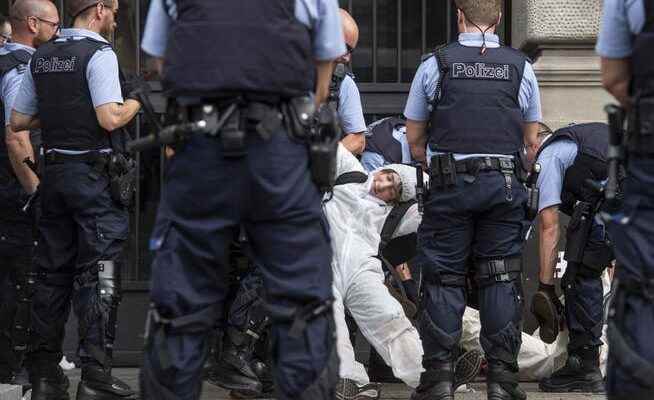Chief Justice Christoph Spiess condemned climate activists and gave them a helping hand: “Keep fighting for your goals, but please do it by legal means!”
Police officers take a climate activist away from the Credit Suisse entrance on Monday, July 8, 2019.
“Banks have money. We’re right!” reads a yellow banner that activists unveiled in front of the entrance to the High Court. A young man holds up a cardboard sign that reads “Don’t watch documentaries”. The court spent the whole day hearing nine young activists between the ages of 21 and 27 who were involved in the blockade in front of Credit Suisse on Zurich’s Paradeplatz on July 8, 2019.
More than 60 climate activists lay in front of three entrances to the Credit Suisse main building on Paradeplatz for around five hours and chained themselves together. They made the big banks partly responsible for the “climate catastrophe” because of financing in the oil and gas sector. When they did not comply with requests to evict, the Zurich city police intervened. The police officers had to use cutting discs to loosen the chains before they could carry the climate activists to the buses.
In May 2021, the district court sentenced eight of them, all from western Switzerland, to conditional fines of 40 daily rates for coercion and trespassing. A young man from Zurich was only fined 30 daily rates for coercion. Because of the large number of participants, the main hearing took place in the People’s House.
Both the accused and the public prosecutor have appealed against the first-instance verdicts. The convicts want acquittal. The public prosecutor requested higher fines of 90 daily rates each. All of the accused refused to testify before the Supreme Court.
Adjusted fines to match accepted penalty orders
The Supreme Court confirmed all guilty verdicts on Friday and even slightly increased the conditional fines. Seven accused will now receive 60 daily rates, one accused will receive 50 daily rates as an additional penalty to another conviction. The man from Zurich, who is not a trespasser, gets away with 40 daily rates.
During the hearing, public prosecutor Daniel Kloiber pointed out that around 50 people involved in the action had accepted their penalty orders of 60 daily rates. The presiding judge Christoph Spiess also finds it “unfair” in the verbal justification for the verdict if their colleagues, who tried the courts, would have gotten off better.
Eight suspects had blocked the entrance on Bärengasse, and the man from Zurich was only active outside the building on the Paradeplatz side. The photos show that the entrances have been thoroughly locked, Spiess explains the guilty verdict. Anyone who does something like this knows what they are doing and does it intentionally. The blockade lasted several hours. It was “a natural guess” that people wanted to go into the bank during this time and were prevented from doing so. It is therefore a clear necessity, even if no victims are known by name.
The action was well organized and planned, and all activists wore white uniforms. It is obviously complicity. The accused did not leave when told to do so and put up quite a bit of passive resistance. Your means was clearly not permissible.
No legal emergency
Nobody today doubts climate change and its danger, says Spiess. However, an alleged legal emergency fails because of the imminent danger that is necessary for this. The accused would also have had every other opportunity to express their criticism legally. “Nor does the court understand how climate change can be benefited by blocking the doors of CS,” he says.
It is not the case that the illegal way is more effective than the legal options. Anyone who consciously chooses the illegal route does not have to complain afterwards. The fundamental rights of freedom of expression and assembly have limits and do not cover illegal activities. Spiess gives the convicts a helping hand: “Keep fighting for your goals, but please do it by legal means!”
A total of seven defense attorneys had previously tried to thoroughly dissect the lower court verdict. Among other things, alleged formal deficiencies, deficiencies in the investigation, contradictory justifications, violation of the right to be heard, incorrect sentencing were criticized. The admonishers and not the culprits were prosecuted.
The public prosecutor’s office treated the peaceful activists too harshly because they wanted to achieve a “chilling effect” in order to prevent further similar actions. The police treat protesters on different topics unequally. There are no victims, no one was hindered or coerced. The verdict is not constitutional and ECHR-compliant. It was a justifiable emergency and the actions were not unlawful.
Prosecutor Daniel Kloiber, on the other hand, warned that not everything that is legitimate for certain groups of people is also legal. With the activists’ arguments about the legitimacy of their action, the floodgates would be wide open to arbitrariness, and one could then abolish basic democratic rights.
Judgment SB210390 of November 18, 2022, not yet final.
